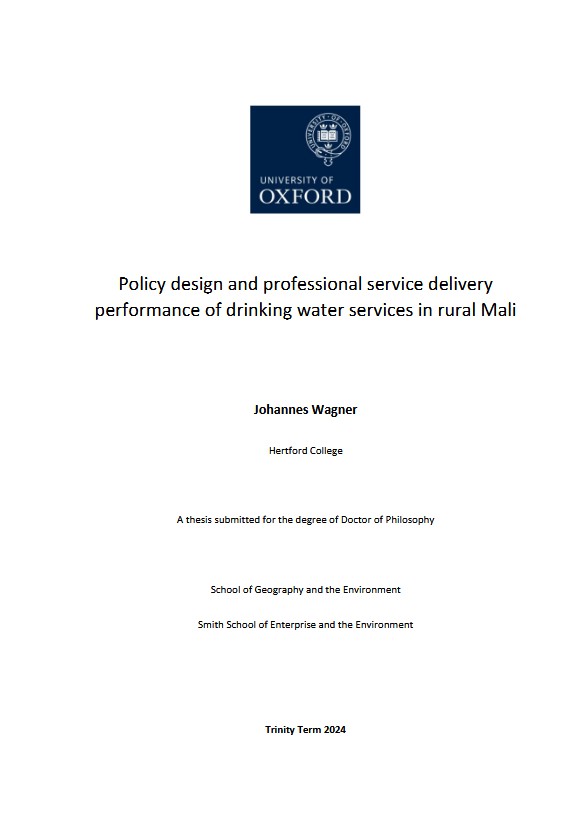Policy design and professional service delivery performance of drinking water services in rural Mali
 |
Conception des politiques et performance de la prestation de services professionnels en matière de services d'eau potable dans le Mali rural
thèse Nov 2024 ; 219 pages
Aut. Johannes Wagner
Ed. Oxford University - Oxford
Téléchargeable sous format: PdF
Téléchargeable chez l'éditeur
Abstract:
This thesis examines how contract design and consumer demand affect revenue generation to sustain the professional delivery of drinking water services in rural Mali. The research provides an empirical and conceptual understanding of the role of 1) contract arrangements, 2) service levels, and 3) tariff designs for revenue generation, contributing new insights for rural water sustainability.
To this end, contractual changes in service delivery – including upgrading handpumps to solar kiosks and changing payment modalities at handpumps from volumetric to flat fees – are analysed drawing on more than 4,800 months of data from 192 waterpoints. Guided by contract and consumer demand theories, the findings indicate that any rural water contract is likely to be incomplete due to the inability to guarantee user demand. While contract renegotiation can help navigate uncertainties in operational and financial performance, unpredictable demand variability limits the scope of revenue generation of a commercial contract design to sustain rural water services. The quantitative analyses apply Interrupted Time Series and fixed effects regression models to estimate revenue and volumetric water use changes from upgrading to solar kiosks and changing payment modalities. Notably, users appear more inclined to pay a volumetric tariff at solar kiosks, resulting in improved revenue generation. Additionally, when payment modalities switch from volumetric to monthly flat fees, a handpump registers, on average, more than three times higher monthly revenue, along with a two-fold increase in daily water use. Yet, regardless of infrastructure type and payment modality, demand remains seasonal, leading to fluctuating revenues with peaks biased to the dry season.
Three recommendations are proposed to steer rural water policy and practice towards more sustainable services.
- First, investments in incremental service level improvements are recommended to meet user demand and enhance revenue generation.
- Second, continuously collected operational and financial service data can be leveraged to inform investment planning, policy design, and service delivery arrangements.
- Third, cost-recovery policies should more clearly consider subsidies to sustain the professional delivery of rural drinking water services.
Mots clefs: |
financement (CI) (DT) (OP) (ope) , rural (CI) (DT) (OP) (ope) , service public de l'eau (CI) (DT) (OP) (ope) , eau potable (CI) (DT) (OP) (ope) |
Pays concerné: |
Editeur/Diffuseur: |
|
Oxford University
-
University of Oxford - Oxford - Royaume Uni |
En cas de lien brisé, nous le mentionner à communication@pseau.org